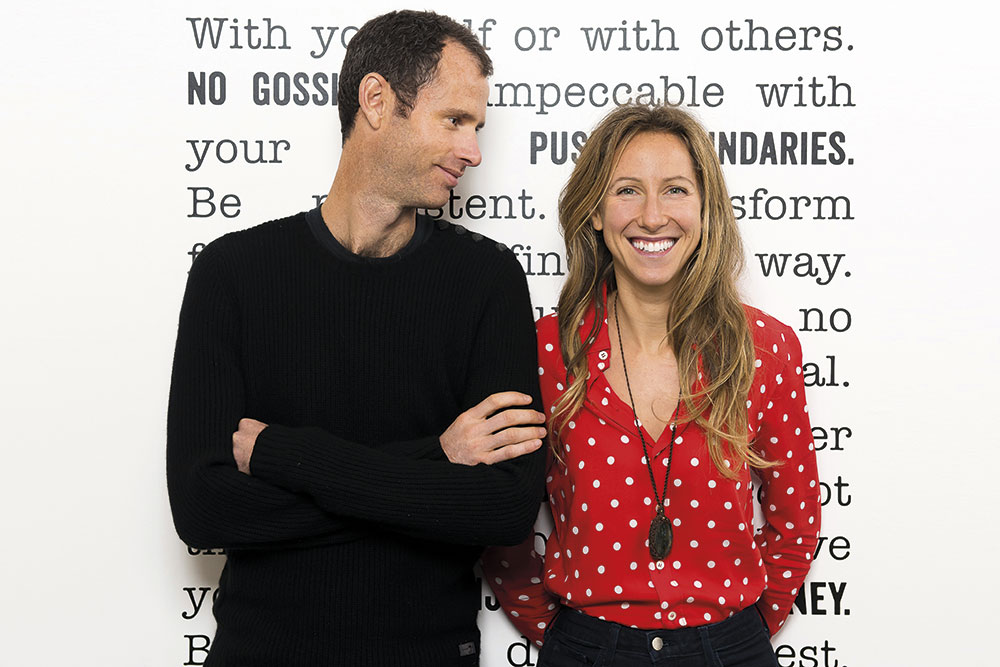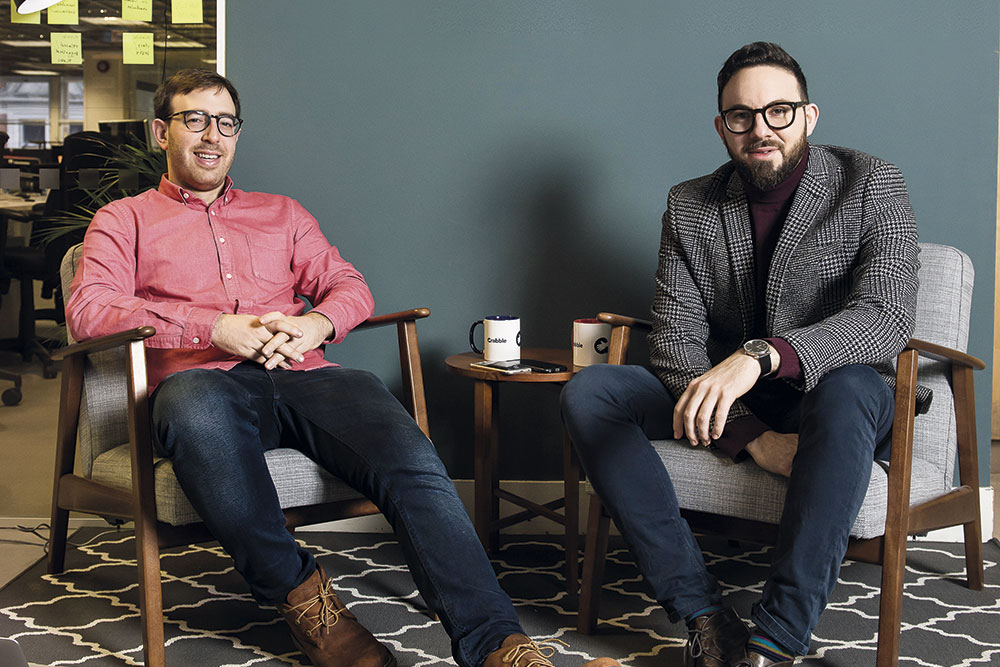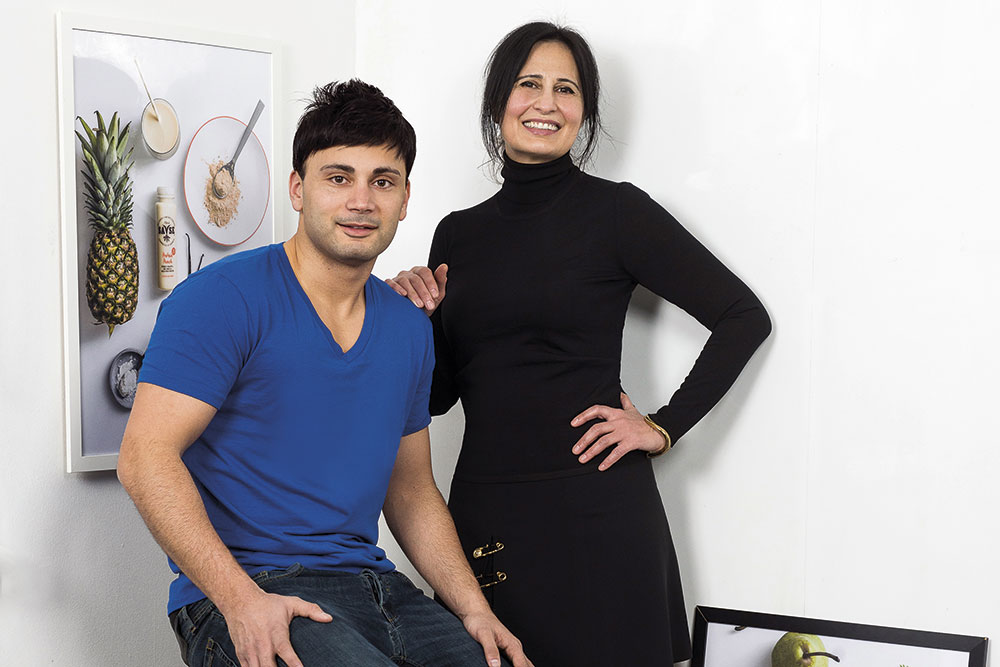Should you start a company with the person closest to you?

THE CHILDHOOD SWEETHEARTS
If you are the sort of person who doesn’t particularly like stories of other peoples’ fairytale lives, then you might want to stop reading now.
Tamara and Ben Arbib (pictured above) have been together since he was 17 and she was 15. They married five years later, with their honeymoon doubling up as her 21st birthday celebration. They now have four children and run Rebel Kitchen – a business that sells organic, non-dairy coconut milk drinks and yogurts.
The vision for Rebel Kitchen is, Tamara says, ‘to redefine health, through food, through business and beyond. Ben was a bit concerned about working together at first,’ she continues. ‘He said: “We’re already so close, we’re entwined in so many things, and it can be dangerous to work with your other half, because work stress can overflow into the marriage.” So he was cautious about going into business with me. But it’s funny – we talk about it all the time now. If you’re involved in a start-up, it’s so stressful and intense that you live and breathe it whether you’re spouses or not.’
NATURAL PAIRING
In truth, there was logic behind Tamara and Ben working together.
Having initially founded a charity, The A Team Foundation, back in 2010, which aimed to increase understanding of the relationship between food and wellbeing, Tamara wanted to take a more active role in helping people to eat well by starting a food and drink company.
Ben, meanwhile, had been busy investing in young start-ups in the tech and gaming worlds, so his skills were exactly what Tamara needed to move her vision forward.
ROLE MODEL
This, Tamara says, might be part of the reason why they have been able to pull off being married and working together.
‘We are involved in such different areas of the business that we barely see each other,’ she laughs. ‘He’s involved in finance, while I’m in sales and marketing. Of course, you have to be careful when you work with your other half to make sure it isn’t all about work. But when you get it right – or if you get it right – it can be magical.’
Does she think that being a couple has ultimately been beneficial? ‘Massively so,’ she says. ‘I don’t know how people aren’t married in business, because we can talk about it all the time. It’s beneficial for the business – maybe not so much for the marriage. But we’re grateful to be working together – and not just because it’s really cracking fun.’
STRONGER TOGETHER
The trust you have in your spouse as a co-partner is greater than you are likely to have with any other business partner.*
THE BFF’s
In the 23 years since they first met aged seven, Dan Murray and Joel Freeman have done a lot as a duo. ‘The short version we tell to scare off some investors,’ says Dan, ‘is that we’ve been to school and university together, travelled, wrote a screenplay and had several businesses together.’
The first business involved planning children’s parties when they were both 14. Joel says: ‘We gave up after the first party. Some of the things we put on were a bit too… adventurous for the parents.’ The second business was more successful – as young adults they sold advertising space on sets of playing cards.
Their big break came in 2013, though, when they launched an app called Grabble – a kind of Tinder for fashion shopping. It was an instant hit. ‘By the end of our first week,’ says Dan, ‘we had made 100,000 sales.’
OPPOSITES ATTRACT
Based in Old Street, the pair’s venture now has a staff of 18 and is growing. On meeting the duo, it’s obvious that their success and enduring friendship is in no small part down to their complementary personalities. Dan, as Joel puts it: ‘Has an amazing energy and is upbeat.’ Joel, meanwhile, is quieter and more considered. It makes sense when they reveal that, having returned from their travels, Joel went into accountancy, which he hated, while Dan went into advertising.
‘The way I describe it,’ says Dan, ‘is that Joel’s the brain, and I’m the mouth. I’m good at selling the vision and big idea, whereas Joel will have the plan and know what needs to be done. The nature of our partnership is that Joel usually drives the ideas, and wants to break out and do something unique.’
The pair have only had one big argument. Joel says: ‘It was on, I think, day two of our travels in Brazil.’ They cite their friendship as the reason they’re able to laugh their way through tough times.
WHAT’S NEXT?
Ask them whether they see themselves always working together and Dan rather sweetly replies: ‘I say to Joel “What do you think we’ll do next?” So I guess it’s a given. But I don’t sit around planning the next thing.’
As well he might not, given that the current project he and the guy he sat next to in primary school is working out so well.
THE MOTHER AND SON
Most people love their mother’s cooking. But not everyone loves their mother’s cooking to the extent that they think the whole world needs to taste it as well.
‘Growing up, mum would make smoothies for me and my sisters,’ says Guka Tavberidze, 32, ‘because it was a good way to sneak vegetables into our diet without us knowing. So when I wanted to start a company, I thought “What’s better than something that comes from your own mother?”’
When Guka researched the market, he was hugely dissatisfied with what he found. Specifically, he didn’t like the fact that his bigger, would-be competitors were reliant on a pasteurisation process for the juices and smoothies they were offering – a process that effectively strips a drink of any nutritional value.
‘I knew that my mother’s smoothies were different and better – taste-wise and nutrition-wise,’ he explains.
‘The challenge was to take what my mother was making (drinks with fresh fruit and vegetables in) and get them into the shops without compromising on anything.’
FIRM RESOLVE
Initially, Guka was told that pasteurisation was the only way.
But anxious to stay true to his mother’s values, he refused to accept this. Eventually, he discovered the now ubiquitous process of cold-pressing – since copied by Innocent, Naked and many other brands – and Savse was born.
Guka’s mother Nina was involved from the word go, despite her initial scepticism that the drinks she made for her children could be the basis of a business.
‘The biggest surprise came when she saw the adverts on billboards and the sides of buses. That was very emotional for her.’
FAMILY VALUES
As well as his mother, Guka’s two sisters, who were of course also raised on their mother’s smoothies, both work at the company, as does his friend Patrick, who he has known since the age of 11. ‘We used to play football together,’ he says.
Even as Savse expands – four years in, they have a staff of 30 people – Guka, his mother and all the Tavberidzes are determined to retain their family values. ‘At least 10 of the employees we have today came through our intern system,’ Guka says. ‘We don’t take on people just for the sake of it – we care about all the people we work with. We want them to feel like a part of the family. It’s who we are.’
SPLIT YOUR DAY
When working with family, carve out separate times to address relationship issues and work. This way, the two shouldn’t overlap.










